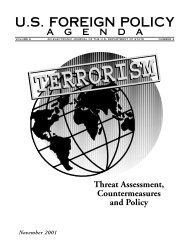s. history us history us history - Embassy of the United States
s. history us history us history - Embassy of the United States
s. history us history us history - Embassy of the United States
- No tags were found...
You also want an ePaper? Increase the reach of your titles
YUMPU automatically turns print PDFs into web optimized ePapers that Google loves.
CHAPTER 14: THE NEW CONSERVATISM AND A NEW WORLD ORDEROUTLINE OF U.S. HISTORYdent <strong>of</strong> <strong>the</strong> R<strong>us</strong>sian republic. At <strong>the</strong>end <strong>of</strong> that year, Yeltsin, now dominant,forced <strong>the</strong> dissolution <strong>of</strong> <strong>the</strong>Soviet Union.The B<strong>us</strong>h administration adeptlybrokered <strong>the</strong> end <strong>of</strong> <strong>the</strong> Cold War,working closely with Gorbachev andYeltsin. It led <strong>the</strong> negotiations thatbrought <strong>the</strong> unification <strong>of</strong> East andWest Germany (September 1990),agreement on large arms reductionsin Europe (November 1990), andlarge cuts in nuclear arsenals (July1991). After <strong>the</strong> liquidation <strong>of</strong> <strong>the</strong>Soviet Union, <strong>the</strong> <strong>United</strong> <strong>States</strong> and<strong>the</strong> new R<strong>us</strong>sian Federation agreedto phase out all multiple-warheadmissiles over a 10-year period.The disposal <strong>of</strong> nuclear materialsand <strong>the</strong> ever-present concerns<strong>of</strong> nuclear proliferation now superseded<strong>the</strong> threat <strong>of</strong> nuclear conflictbetween Washington and Moscow.THE GULF WARThe euphoria ca<strong>us</strong>ed by <strong>the</strong> drawingdown <strong>of</strong> <strong>the</strong> Cold War was dramaticallyovershadowed by <strong>the</strong> Aug<strong>us</strong>t2, 1990, invasion <strong>of</strong> <strong>the</strong> smallnation <strong>of</strong> Kuwait by Iraq. Iraq, underSaddam H<strong>us</strong>sein, and Iran, under itsIslamic fundamentalist regime, hademerged as <strong>the</strong> two major militarypowers in <strong>the</strong> oil-rich Persian Gulfarea. The two countries had fought along, inconcl<strong>us</strong>ive war in <strong>the</strong> 1980s.Less hostile to <strong>the</strong> <strong>United</strong> <strong>States</strong> thanIran, Iraq had won some supportfrom <strong>the</strong> Reagan and B<strong>us</strong>h administrations.The occupation <strong>of</strong> Kuwait,posing a threat to Saudi Arabia,changed <strong>the</strong> diplomatic calculationovernight.President B<strong>us</strong>h strongly condemned<strong>the</strong> Iraqi action, called forIraq’s unconditional withdrawal,and sent a major deployment <strong>of</strong> U.S.troops to <strong>the</strong> Middle East. He assembledone <strong>of</strong> <strong>the</strong> most extraordinarymilitary and political coalitions <strong>of</strong>modern times, with military forcesfrom Asia, Europe, and Africa, aswell as <strong>the</strong> Middle East.In <strong>the</strong> days and weeks following<strong>the</strong> invasion, <strong>the</strong> U.N. SecurityCouncil passed 12 resolutions condemning<strong>the</strong> Iraqi invasion andimposing wide-ranging economicsanctions on Iraq. On November 29,it approved <strong>the</strong> <strong>us</strong>e <strong>of</strong> force if Iraqdid not withdraw from Kuwait byJanuary 15, 1991. Gorbachev’s SovietUnion, once Iraq’s major arms supplier,made no effort to protect itsformer client.B<strong>us</strong>h also confronted a majorconstitutional issue. The U.S. Constitutiongives <strong>the</strong> legislative branch<strong>the</strong> power to declare war. Yet in <strong>the</strong>second half <strong>of</strong> <strong>the</strong> 20th century, <strong>the</strong><strong>United</strong> <strong>States</strong> had become involvedin Korea and Vietnam without an<strong>of</strong>ficial declaration <strong>of</strong> war and withonly murky legislative authorization.On January 12, 1991, three daysbefore <strong>the</strong> U.N. deadline, Congressgranted President B<strong>us</strong>h <strong>the</strong> authorityhe sought in <strong>the</strong> most explicit andsweeping war-making power given apresident in nearly half a century.The <strong>United</strong> <strong>States</strong>, in coalitionwith Great Britain, France, Italy,Saudi Arabia, Kuwait, and o<strong>the</strong>rcountries, succeeded in liberatingKuwait with a devastating, U.S.-ledair campaign that lasted slightlymore than a month. It was followedby a massive invasion <strong>of</strong> Kuwaitand Iraq by armored and airborneinfantry forces. With <strong>the</strong>ir superiorspeed, mobility, and firepower, <strong>the</strong>allied forces overwhelmed <strong>the</strong> Iraqiforces in a land campaign lastingonly 100 hours.The victory, however, was incompleteand unsatisfying. The U.N. resolution,which B<strong>us</strong>h enforced to <strong>the</strong>letter, called only for <strong>the</strong> expulsion <strong>of</strong>Iraq from Kuwait. Saddam H<strong>us</strong>seinremained in power, savagely repressing<strong>the</strong> Kurds in <strong>the</strong> north and <strong>the</strong>Shiites in <strong>the</strong> south, both <strong>of</strong> whom<strong>the</strong> <strong>United</strong> <strong>States</strong> had encouraged torebel. Hundreds <strong>of</strong> oil-well fires, deliberatelyset in Kuwait by <strong>the</strong> Iraqis,took until November 1991 to extinguish.Saddam’s regime also apparentlythwarted U.N. inspectors who,operating in accordance with SecurityCouncil resolutions, worked tolocate and destroy Iraq’s weapons <strong>of</strong>mass destruction, including nuclearfacilities more advanced than hadprevio<strong>us</strong>ly been s<strong>us</strong>pected and hugestocks <strong>of</strong> chemical weapons.The Gulf War enabled <strong>the</strong> <strong>United</strong><strong>States</strong> to persuade <strong>the</strong> Arab states,Israel, and a Palestinian delegationto begin direct negotiations aimedat resolving <strong>the</strong> complex and interlockedissues that could eventuallylead to a lasting peace in <strong>the</strong> region.The talks began in Madrid, Spain,on October 30, 1991. In turn, <strong>the</strong>yset <strong>the</strong> stage for <strong>the</strong> secret negotiationsin Norway that led to what at<strong>the</strong> time seemed a historic agreementbetween Israel and <strong>the</strong> PalestineLiberation Organization, signedat <strong>the</strong> White Ho<strong>us</strong>e on September13, 1993.PANAMA AND NAFTAThe president also received broadbipartisan congressional backing for<strong>the</strong> brief U.S. invasion <strong>of</strong> Panama onDecember 20, 1989, that deposeddictator General Manuel AntonioNoriega. In <strong>the</strong> 1980s, addiction tocrack cocaine reached epidemic proportions,and President B<strong>us</strong>h put <strong>the</strong>“War on Drugs” at <strong>the</strong> center <strong>of</strong> hisdomestic agenda. Moreover, Noriega,an especially brutal dictator,had attempted to maintain himselfin power with ra<strong>the</strong>r crude displays<strong>of</strong> anti-Americanism. After seekingrefuge in <strong>the</strong> Vatican embassy,Noriega turned himself over to U.S.authorities. He was later tried andconvicted in U.S. federal court inMiami, Florida, <strong>of</strong> drug traffickingand racketeering.On <strong>the</strong> economic front, <strong>the</strong> B<strong>us</strong>hadministration negotiated <strong>the</strong> NorthAmerica Free Trade Agreement(NAFTA) with Mexico and Canada.It would be ratified after an intensedebate in <strong>the</strong> first year <strong>of</strong> <strong>the</strong> Clintonadministration. 9316317












